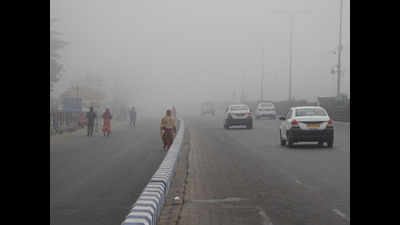- News
- City News
- kolkata News
- Kolkata in sick bay as temperature swing spreads cold, fever
Trending
This story is from January 22, 2020
Kolkata in sick bay as temperature swing spreads cold, fever
A late-winter temperature fluctuation has activated a spate of viruses in Kolkata, leading to the spread of cough and cold infection, accompanied by fever. Children and the elderly have been affected in large numbers. With the mercury unlikely to settle till at least the end of this week, the outbreak may not end soon. It might complicate matters if the dreaded coronavirus, now raging in China and had similar symptoms, reached the city, feared experts.

Thick layer of fog engulfs Kolkata as the temperature falls down in city on Sunday. (ANI File Photo)
KOLKATA: A late-winter temperature fluctuation has activated a spate of viruses in Kolkata, leading to the spread of cough and cold infection, accompanied by fever. Children and the elderly have been affected in large numbers. With the mercury unlikely to settle till at least the end of this week, the outbreak may not end soon. It might complicate matters if the dreaded coronavirus, now raging in China and had similar symptoms, reached the city, feared experts.
The city’s maximum temperature swayed violently last week, jumping from 22 degrees Celsius to 29 degrees before sliding down to 22 degrees again. It could rise again, predicted the Met office. Such frequent temperature variations help viruses multiply, especially when the mercury slides up. “Most common viruses, like rhino, human meta-pneumo and the influenza virus die out in cold. They start multiplying when the ambient temperature and humidity rises, which is happening now. When the temperature remains low, our immune system and body temperature adapt to the change. If the mercury shoots up suddenly, it fails to adjust to the alteration, making us vulnerable to viral attacks,” said AMRI Hospital consultant Debashish Saha.
A traffic sergeant with the Kolkata Police contracted a respiratory tract infection and had to be admitted to a private hospital off EM Bypass this week. According to doctors, he had shed his warm clothes during the afternoon heat last week and consumed chilled water. “But the temperature dropped immediately after that. His system was rendered vulnerable by the temperature change and this is a classic case of a viral attack. There are thousands like him across the city now,” said Fortis Hospital internal medicine consultant Joydeep Ghosh.
While rhino virus, human meta-pneumo virus and influenza virus are likely to have struck, it is difficult to identify them unless a test is carried out. But the state doesn’t have the facility. It is the viral fever with severe cough that has doctors worried as it has been striking children more frequently. “A persistent cough has struck scores of children over the last one week. In some cases, it is accompanied by fever. Those with a history of respiratory illnesses, like asthma, have been suffering more than the rest. Children are more vulnerable due to their low immunity and the fact that they are more likely to catch an infection from their school or while travelling by public transport,” said paediatrician Shantanu Ray.
The city’s maximum temperature swayed violently last week, jumping from 22 degrees Celsius to 29 degrees before sliding down to 22 degrees again. It could rise again, predicted the Met office. Such frequent temperature variations help viruses multiply, especially when the mercury slides up. “Most common viruses, like rhino, human meta-pneumo and the influenza virus die out in cold. They start multiplying when the ambient temperature and humidity rises, which is happening now. When the temperature remains low, our immune system and body temperature adapt to the change. If the mercury shoots up suddenly, it fails to adjust to the alteration, making us vulnerable to viral attacks,” said AMRI Hospital consultant Debashish Saha.
A traffic sergeant with the Kolkata Police contracted a respiratory tract infection and had to be admitted to a private hospital off EM Bypass this week. According to doctors, he had shed his warm clothes during the afternoon heat last week and consumed chilled water. “But the temperature dropped immediately after that. His system was rendered vulnerable by the temperature change and this is a classic case of a viral attack. There are thousands like him across the city now,” said Fortis Hospital internal medicine consultant Joydeep Ghosh.
While rhino virus, human meta-pneumo virus and influenza virus are likely to have struck, it is difficult to identify them unless a test is carried out. But the state doesn’t have the facility. It is the viral fever with severe cough that has doctors worried as it has been striking children more frequently. “A persistent cough has struck scores of children over the last one week. In some cases, it is accompanied by fever. Those with a history of respiratory illnesses, like asthma, have been suffering more than the rest. Children are more vulnerable due to their low immunity and the fact that they are more likely to catch an infection from their school or while travelling by public transport,” said paediatrician Shantanu Ray.
The common viruses trigger similar symptoms, which recede in three-five days, according to consultant P K Nemani. “But a bacterial infection can lead to complications and delay recovery. The elderly and children are vulnerable,” said Nemani. Seasonal viruses were highly contagious, so an outbreak was difficult to prevent in winter, said Belle Vue Clinic critical care consultant Samarjit Naskar. “These viruses are transmitted through sneeze and cough droplets, which can travel six feet. So, public places and transport usually help spread them. The only option is to use handkerchiefs and not to touch objects with bare hands,” said Naskar.
End of Article
FOLLOW US ON SOCIAL MEDIA










